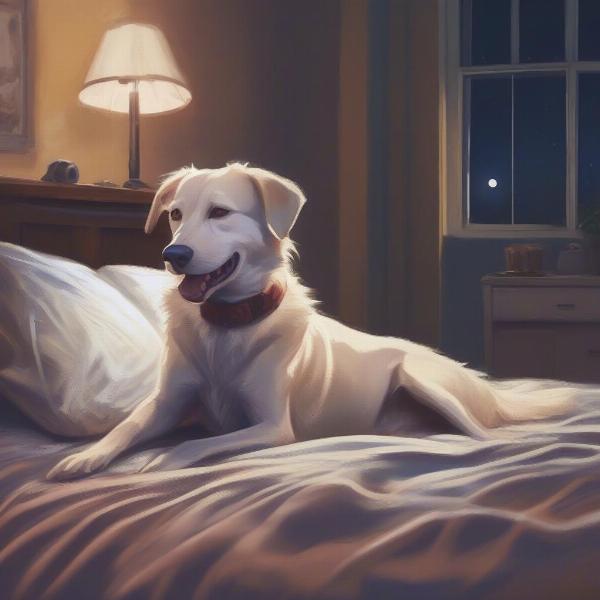If you’ve noticed your dog panting at night, you’re likely wondering what’s causing it. While panting is a normal way for dogs to regulate their body temperature, excessive panting, especially at night, can be a sign of an underlying issue. This article will explore the various reasons why your dog might be panting at night, from simple explanations like being too warm to more serious medical conditions. Understanding these causes can help you determine if your furry friend needs a trip to the vet.
Common Causes of Nighttime Panting in Dogs
There are several reasons why your dog might be panting at night, and some are perfectly normal. Let’s explore the most common ones:
-
Overheating: Just like us, dogs can get too warm at night, especially during warmer months or if they’re snuggled under too many blankets. A slightly elevated body temperature can lead to panting.
-
Anxiety or Stress: Dogs can experience anxiety or stress for various reasons, including separation anxiety, loud noises, or changes in their routine. Panting is a common symptom of anxiety in dogs. If your dog pants excessively at night, they might be suffering from anxiety. You may also find that your dog howls in his sleep due to the underlying stress and anxiety.
-
Pain or Discomfort: If your dog is experiencing pain from an injury, illness, or arthritis, they may pant as a way to cope with the discomfort.
-
Obesity: Overweight dogs are more prone to overheating and may pant more frequently, even at night.
-
Medication Side Effects: Certain medications can cause panting as a side effect. If your dog started a new medication recently, check with your vet to see if panting is a listed side effect.
 Dog panting at night due to heat
Dog panting at night due to heat
When to Worry About Your Dog Panting at Night
While some panting is normal, excessive or unusual panting warrants further investigation. Here are some red flags to watch out for:
-
Loud or Labored Panting: If your dog’s panting is unusually loud, accompanied by wheezing or other respiratory distress, it could indicate a serious medical condition.
-
Changes in Gum Color: Pale or bluish gums can signify a lack of oxygen and require immediate veterinary attention.
-
Excessive Drooling: Excessive drooling combined with panting could point to a heatstroke, poisoning, or another medical emergency.
-
Restlessness and Pacing: If your dog is panting excessively, restless, and pacing at night, they could be in pain or experiencing anxiety. If your dog is restless at night, it’s important to understand the reasons behind their behavior.
-
Other Symptoms: If panting is accompanied by other symptoms like vomiting, diarrhea, or lethargy, it’s crucial to consult a vet immediately.
What to Do If Your Dog Pants Excessively at Night
If you’re concerned about your dog’s nighttime panting, the best course of action is to consult with a veterinarian. They can perform a thorough examination to determine the underlying cause and recommend appropriate treatment.
Here are some steps you can take while waiting for your vet appointment:
-
Ensure a Cool Environment: Make sure your dog has access to a cool, well-ventilated area. You can use a fan or air conditioning to help regulate the temperature. Consider lightweight dog fleece sweaters during colder months to ensure they are warm enough without overheating. Consider getting some snow pants dogs can wear when the ground is cold.
-
Provide Fresh Water: Always ensure your dog has access to fresh, cool water.
-
Create a Calm Atmosphere: If you suspect anxiety is the cause, try to create a calm and relaxing environment for your dog. A comfortable bed, soothing music, or a familiar toy can help.
Conclusion
Nighttime panting in dogs can be caused by various factors, ranging from simple overheating to more serious medical conditions. Observing your dog’s behavior and looking for accompanying symptoms can help you determine if the panting is a cause for concern. If you are worried about your dog panting excessively at night, consult your veterinarian for a proper diagnosis and treatment plan. Early intervention can significantly improve your dog’s comfort and well-being.
FAQ
- Is it normal for dogs to pant a little at night? Yes, some panting is normal, especially if the environment is warm.
- When should I be concerned about my dog’s panting? If the panting is excessive, loud, labored, or accompanied by other symptoms like pale gums, drooling, or restlessness, you should consult a vet.
- Can anxiety cause panting in dogs? Yes, anxiety is a common cause of panting in dogs.
- What should I do if my dog is panting heavily at night? Ensure a cool environment, provide fresh water, and contact your veterinarian.
- What are the signs of heatstroke in dogs? Excessive panting, rapid heartbeat, bright red gums, vomiting, and collapse are signs of heatstroke and require immediate veterinary attention.
- Can pain cause a dog to pant at night? Yes, dogs may pant if they are experiencing pain or discomfort.
- What medications can cause panting in dogs? Certain medications can cause panting as a side effect. Check with your vet if you suspect your dog’s medication is the cause.
Related Articles:
- dog pants excessively at night
- my dog howls in his sleep
- my dog is restless at night
- snow pants dogs
- dog fleece sweaters
About ILM Dog: ILM Dog is your trusted source for expert advice on dog care and wellbeing. We offer a wide range of resources on dog breeds, health, training, nutrition, grooming, and much more to help you provide the best possible care for your furry companion. From choosing the right breed to understanding your dog’s health needs, ILM Dog is here to support you every step of the way. Contact us at [email protected] or +44 20-3965-8624 for personalized advice and support.